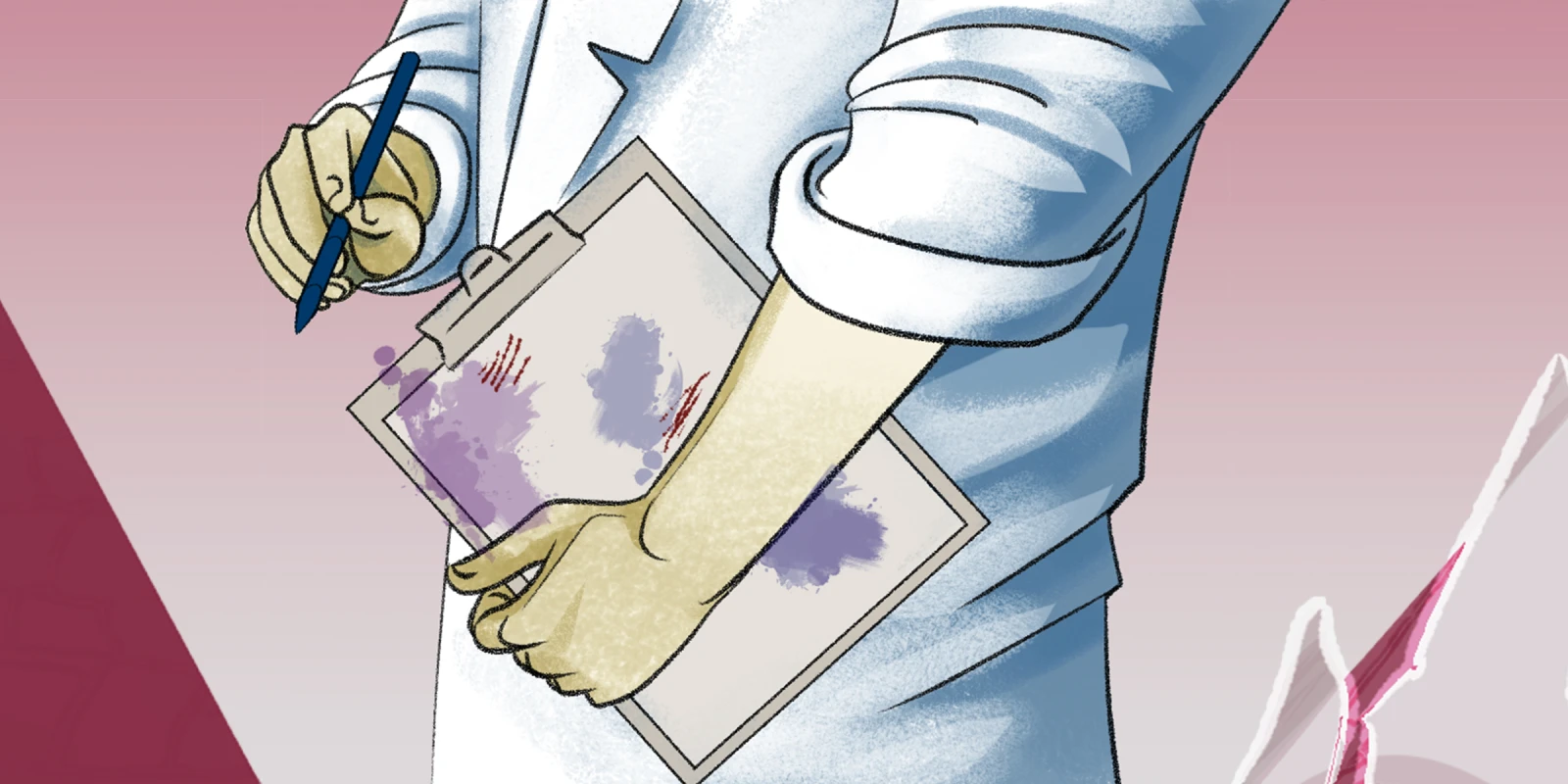This is part of the Medical Humanities Series on Op-Med, which showcases creative work by our members. Do you have a poem, short story, creative nonfiction or visual art piece related to medicine that you’d like to share with the community? Send it to us here.
The Man Who Mistook His Wife for a Doormat
Editor’s Note: The following article contains depictions of domestic abuse.
For the last year of my marriage, I can do nothing right in my husband’s eyes.
He feels bored and stagnant with me and this is my fault. I am no longer physically desirable to him. He dislikes my kiss, my too-thin body, and my “chicken legs.”
Some days, I stand naked before my mirror, crying as I study my flawed body. I feel unattractive and undesirable.
I pass cups of hot tea to him incorrectly. Perhaps I have a higher heat tolerance than he does, and so I am insensitive to this infraction, but I learn after several lectures. He is ill when we stop at a convenience store. I decided to surprise him with a cup of hot green tea. I pass it to him through the car window and am met with a furious, “Chloe, look at what you’re doing and tell me what you’re doing wrong!”
I apologize, and I learn that I do not even apologize correctly: “Say you’re sorry like you mean it.”
I will never master the correct apology. “Apologize to me like you mean it,” becomes a regular refrain when I apologize for the many transgressions that I unwittingly commit.
He does not respect me because I am weak and passive. My self-esteem is too low, he says. Wonder how that happened.
I learn to adapt.
I remind myself of the unofficial house rules daily, so I can keep the peace. It is easier for me to be compliant than to fight back.
Stop talking to yourself while you are cooking because he finds it irritating.
Keep your voice low in the evening. Throughout most of the evening. To be safe.
Tell him, “I’m walking out of the bedroom to the bathroom,” if you need to use the bathroom at night. You might startle him otherwise, and he will be angry. Don’t tell him too loudly, or you will startle him and he will be angry. Don’t tell him too quietly, or he will not hear you, and you will startle him, and he will be angry.
Don’t tell him when you receive Honors in a clinical rotation, because it makes him anxious, and he should not be anxious. It upsets him, it is unfair to him.
Be lighthearted for him, even when you are breaking inside, or he will be angry.
This is my existence for months, and I convince myself that it is normal.
This is the type of thing that is not supposed to happen to women like me. Physicians are educated. Careful. Consummately rational. We make good decisions.
An attending had once told me that the question, “Do you feel safe at home?” must be asked on average seven times by a clinician before an intimate partner violence (IPV) victim admits to feeling unsafe.
In my case: clinicians and friends must ask upward of 10 times.
Partly because I am ashamed, and partly because I am not sure that I am feeling unsafe. I know that I am unhappy, and sometimes, I am afraid, but I am not sure if those feelings are warranted, and I drive myself insane thinking about it.
I believe that something might be wrong with me. Or I am too tired to fight. I’m not sure which it is. I stop objecting and become a shell of myself.
We are taught to screen for IPV in the clinical setting. To ask patients whether they feel safe at home and to recognize warning signs.
But we are never taught about the next step when it happens to us, when the clinician becomes the victim of domestic abuse. Whom do I tell? How can I tell anyone? What will my colleagues think of me, of my judgment? What if they think I’m incompetent as a physician? What if they dismiss me? What if the problem is me? What if I’m overreacting?
And so, I remain silent.
I feel hypocritical when I am in the psychiatry unit, working with patients who report abuse histories. You deserve so much better, why do you not recognize that? I want to scream. But I make excuses when I ask myself the same questions.
By day, I encourage and counsel patients to seek the resources that they deserve for a better life. By night, I return to a husband who values me less and less as time passes, and who lets me know in no uncertain terms just how unimportant and burdensome I am to him. He is presently finding the company of sex workers infinitely more diverting than I am. Several months later, he will push me down onto our bed and wrap his hands around my throat, but I do not know this yet.
I only realize the weight of his everyday assaults when I leave him, and I notice, over the next several weeks, that my heart is not racing and I am not tiptoeing around my home, anxiously anticipating the next explosion. I am intrigued by this new feeling of calm.
I usually love rainy days; they are a time to curl up, catlike, on my sofa with a cup of hot chocolate and my favorite book, a candle burning in the background that fills the room with the scent of lavender. But rainy days make my husband miserable, because they are gray days with no sunlight, and so there is more to find wrong with me. And so, I learn to hate rainy days; I wake up overcome with dread when I peek out the window and see the sky filled with clouds. When I leave him, that same fear upon seeing a gray sky on mornings fills me – until I realize that I am no longer beholden to his moods, and I may be permitted to enjoy my rainy day. I wonder: when will I finally wake up to a rainy day and no longer feel afraid?
Once I am finally free, my desire to fight for myself returns.
I want to tell the story that I would have wanted to hear during that last year, so I would have felt less alone. I write the words that I wish I could have said to the partner who hurt me:
You are not allowed to demean me, to attempt to break my spirit, to treat me as though I am nothing, to lay your hands on me in anger with impunity. I will not let you.
An Interview with the Author
What inspired this narrative piece?
I made the decision to leave a toxic marriage. In addition to egregious infidelity on his end, my then-partner subjected me to severe emotional abuse and was starting to become physically abusive. During the last year of my marriage to him, I felt isolated, scared, and lonely. I did not feel that I could speak honestly to anyone because I was so consumed with shame, and I also felt that something must be wrong with me for my partner to treat me the way he did. With the help of my family and some very dear friends, it started to dawn on me that I might have lost my life had I stayed, and I slowly started to talk openly about the abusive component of the relationship. When I left, my life was suddenly destabilized and I struggled with depressive symptoms and nightmares for a long time. As I started to speak about my experience a little more openly, other women in medicine shared with me their own experiences of IPV. I realized that IPV is a horrific experience that crosses all boundaries and that it happens to women in medicine too. I decided to share my story openly so that other women who may be in similar situations know that they are not alone and do not feel the same sense of isolation that I did. The sense of community that I felt when other women shared their stories with me was a significant part of my healing process, and I cannot overstate how grateful I am to those women.
What inspired the title of your piece?
The neurologist Oliver Sacks wrote a well-known book entitled "The Man Who Mistook his Wife for a Hat." A significant part of my recovery from the trauma of experiencing an abusive relationship was humor. I had to figure out ways to make myself smile, and I had a few amazing friends who never failed to make me laugh and would help take my mind off the darkness in my life. The title of this piece was my little joke to myself in reference to Dr. Sacks' book, and it is my reminder to myself to find the small joys in life, even in a time of pain.
How long have you been writing and reflecting on your experiences?
My bachelor’s degree is in classics and I love prose. To cope with the upheaval in my life, I started writing short essays about whatever I was feeling. Writing helped me find the voice that had been suppressed for such a long time by this marriage.
Narrative reflections are a part of medical school that I genuinely appreciated. They always reminded me that medicine is as much an art as a science and helped me remember the humanistic side that is intrinsic to medicine. I continued writing these reflections into my final year of medical school unprompted, and will likely continue doing so through residency and further.
How does this submission relate to your medical practice?
I had an interest in women’s mental health that became far stronger after experiencing an abusive relationship, and so I became determined to tailor my future practice to survivors of domestic violence and trauma-informed care. I also grew to appreciate narrative medicine, as it was instrumental in my own healing process, and I very much want to bring that into my practice in the future.
If you or someone close to you has experienced domestic violence, please call the National Domestic Violence Hotline at 1-800-799-SAFE or text START to 88788.
Chloe Lee is a fourth-year medical student.
Illustration by April Brust







